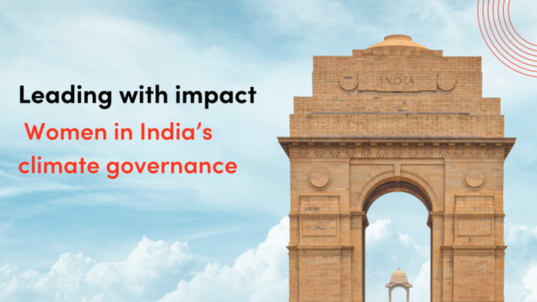Climate change is not only impacting local communities, ecosystems, and economies across India but is also deepening existing gender inequalities. Evolving climate needs demand a broader and more inclusive approach that take gender into strong consideration. Women have played a significant role in shaping India’s climate policies, sustainability initiatives and advocacy efforts. Their influence extends from local, panchayat (village) level governance to national bodies. To spotlight the significant contributions that women leaders are making in India’s climate governance, we convened a panel discussion inviting dynamic women leaders from across India to share their insights and experiences.
The key takeaways from the session are below:
The discussion kicked off with an opening address delivered by Divya Sharma, Executive Director, Climate Group, India. She emphasised that despite women's substantial contributions to positive climate action, they are marginalised and overlooked from mainstream decision-making processes. This is attributable, in part, to institutional inefficiencies and a historical undervaluing of women's voices in shaping a better society.
The panel comprised senior women government officials from four states and one Union Territory – West Bengal, Bihar, Kerala, Tamil Nadu and Delhi. The panellists remarked on the key climate challenges and vulnerabilities that their respective states face and how gender-responsive policies can help in building climate resilience. The panel also highlighted the role of women in key projects and initiatives citing state specific case studies.
Ms. Devlina Saha, Senior Project Associate, Department of Environment, Government of West Bengal spoke about West Bengal’s proactive measures to combat climate change, being catalysed by female participation. Ms. Saha cited an example of how rural women have ensured planting of 150 million mangrove saplings which has led to environmental benefits and livelihood opportunities for coastal communities. She also pointed out the uniqueness of the West Bengal Environment Department in being led by women officials and department heads. Ms. Supriya Sahu, Additional Chief Secretary, Department of Environment, Climate Change and Forests, Government of Tamil Nadu highlighted the state's approach to climate change through establishing the Tamil Nadu Green Climate Company, the first-of-its-kind in India on climate action. She reflected on the company’s three key mission areas – the Green Tamil Nadu Mission, the Climate Change Mission, and the Wetlands Mission. She aims to encourage female participation through the ambitious goal of planting 5.5 crore trees within the state this year. It is expected that this will lead to an increase in green cover from 23.7% to 33% over the next decade.
Ms. Bandana Preyashi, Secretary, Environment, Forest and Climate Change Department, Government of Bihar focused on Bihar’s climate vulnerability including annual floods that disproportionately affect women. She emphasised the importance of adopting gender-sensitive approaches and how women in leadership roles can bring about a climate-friendly and gender-sensitive perspective to policies. She also noted the state’s efforts in integrating gender and green budgets in the planning phase.
Representing the Government of NCT of Delhi, Ms. Reena Gupta, Advisor to the Environment Minister, spoke of the work of women panchayat [village] leaders at the local level in India and their role in the famous Chipko movement. [The Chipko movement was an Indian environmental protest held in the state of Uttarakhand, to prevent deforestation and commercial logging.]
Dr. Nirmala Sanu George, Advisor, Kerala Institute of Local Administration, Government of Kerala drew attention to the lack of gender-disaggregated data in national and state-level climate and disaster policies and how this hindered gender-responsive climate governance. She emphasised the limitations in capacity building and data availability as significant challenges in addressing climate change effectively.
The session closed with Ms. Ulka Kelkar, Director, Climate Program at WRI India speaking about the emergence of new green jobs as the economy shifts toward low carbon technologies. She focused on how women can leverage this opportunity by acquiring new green skills and enhance their participation in the workforce, particularly in areas like the EV auto industry and renewable energy technologies.
Deliberations such as this panel discussion are needed to ensure we are moving the needle on climate action with women’s participation. As another takeaway, the current and future energy transition offers a fantastic opportunity to realise the potential for greater inclusion of more women leaders in the broader climate discourse to encourage gender focused solutions.
